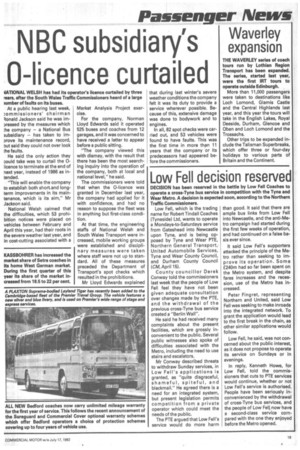NBC subsidiary's 0-licence curtailed
Page 13

If you've noticed an error in this article please click here to report it so we can fix it.
iATIONAL WELSH has had its operator's licence curtailed by three rears, after the South Wales Traffic Commissioners heard of a large lumber of faults on its buses.
At a public hearing last week, .:ommissioners' chairman ionald Jackson said he was imPressed by the measures which :he company — a National Bus lubsidiary — has taken to improve its maintenance record, Jut said they could not over look the faults.
He said the only action they ;ould take was to curtail the 0licence to terminate at the end of next year, instead of 1986 as intended.
"This will enable the company to establish both shortand longterm improvements in its maintenance, which is its aim," Mr Jackson said.
National Welsh calmed that the difficulties, which 53 prohibition notices were placed on vehicles between February and April this year, had their roots in the severe weather last year, and in cost-cutting associated with a
Market Analysis Project exercise.
For the company, Norman Lloyd Edwards said it operated 525 buses and coaches from 12 garages, and it was concerned to have received a letter to appear before a public sitting.
"The company viewed this with dismay, with the result that there has been the most searching inquiry into the operation of the company, both at local and national level," he said.
The commissioners were told that when the 0-licence was granted in December last year, the company had applied for it with confidence, and had no reason to suppose the fleet was in anything but first-class condition.
At that time, the engineering staffs of National Welsh and South Wales Transport were increased, mobile working groups were established and disciplinary measures were taken where staff were not up to standard. All of these measures preceded the Department of Transport's spot checks which resulted in the prohibitions.
Mr Lloyd Edwards explained that during last winter's severe weather conditions the company felt it was its duty to provide a service wherever possible. Because of this, extensive damage was done to bodywork and to engines.
In all, 82 spot checks were carried out, and 53 vehicles were found to have faults. This was the first time in more than 11 years that the company or its predecessors had appeared before the commissioners.
















































